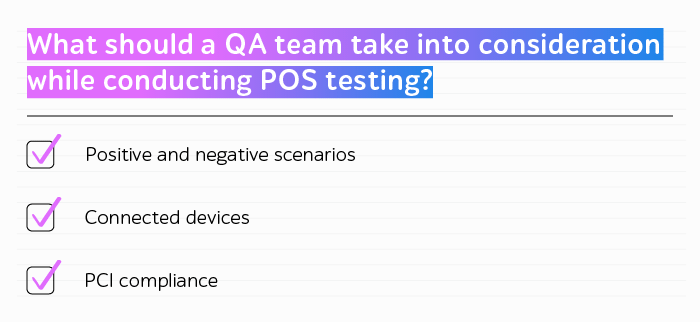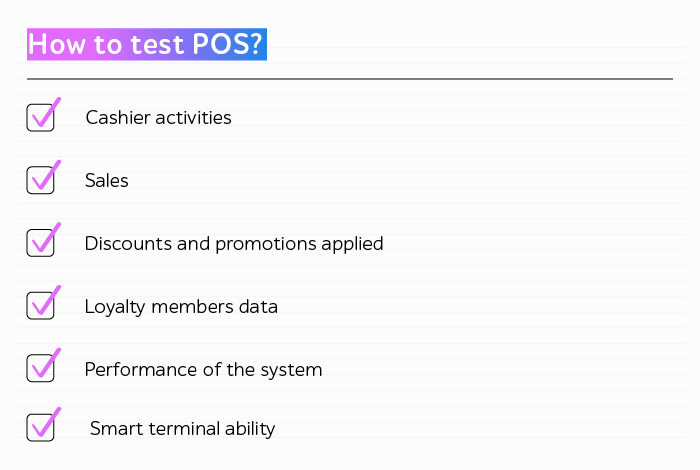
Testing point of sale: challenges and solutions
What is POS?
A POS (point of sale) is a software-hardware combination designed to bring all merchant’s ecosystem together.
Visually, it is a computer connected to a number of peripheral devices. The computer collects all information on sales transactions and inputs it into the storage system.
Why is it so important to ensure quality of POS solutions through rigorous testing?
Retail is a highly competitive business. A good point of sale can make a significant difference. It will increase process efficiency by eliminating unnecessary work. If the POS doesn’t function as expected it’s likely to cause significant troubles:
- More man-hours will be needed to process and correct unreliable and slow checkouts.
- Risks of incorrect records and employees thefts or misbehavior will go up.
- Costs control will become more challenging.
- Sales reports will provide erroneous information preventing to make informed business decisions.
- Promotions, discounts, and coupons will be hard to get tracked.
- Business may lose loyal customers due to incorrect loyalty members’ data.
Therefore, it’s clear that any POS solution should be reliable, easily scalable and maintainable, highly performing, secure, and customizable. To ensure all this, it demands a lot of focus on testing the solution properly before deploying it.
Throughout POS testing, a QA team should bear in mind
- Positive and negative scenarios: To prevent any issues at the customer end, test cases should be designed covering every positive and negative scenario (invalid PIN, expired card, etc.).
- Connected devices: Peripheral devices connected to a POS (a barcode scanner or a cash drawer) may cause some issues that should be considered by a professional QA team.
- PCI compliance: Electronic payment is the basis of any POS solution. Hence, a good POS system should meet the globally accepted security standard such as PCI compliance to protect cardholders’ data and integrity.

Conducting POS testing
A rigorous test scenario aimed at ensuring high quality of POS solutions should include the point given below:
1. Cashier activities: This should be the starting point in every POS testing project.
These are the main points that should be checked by a QA engineer:
- Correctness of the entry of items purchased
- Correctness of the Total applied
- Validity of discount coupons/gift cards
- Total and closing figures match.
2. Sales: Regular sales, sales with a credit/debit card, manage of return and exchange, quantities and prices.
3. Discounts and promotions applied.
4. Loyalty members data: The system should track who the customers are, what kind of purchases they make, and how often. The effective POS system will also remind you to e-mail your customers prior to their birthday, for example.
5. Performance of the system: How long does it take to send a request and get a response applying all transaction rules?
6. Smart terminal ability to read various kinds of cards.

Testing POS software applications
There are apps for any retail need in the market: accounting apps, eCommerce solutions, employee management, etc. Their objective is to automate and streamline some aspects of the retail workflow. By synchronizing their data with any of the apps, merchants get an opportunity to manage stocktaking and wastage data, increase customers’ loyalty, collect the feedback, etc.
But once again.
Each and every app should be tested.
Usually, it will take functional and integration testing to ensure the app delivers its value. Functional testing will check the app from the functional requirements standpoint, while integration testing will detect any issues related to the app connection to other business software solutions.
When testing apps for POS terminals, one has to focus on all the scenarios. A good tester should be able to get into the shoes’ of a cashier serving the customers and check all the flows.
It’s also important to differentiate between the functionality of the app and that of the POS. To do this, good test documentation is needed and the team should be aware of all business and user requirements.
Check out the case study on how the a1qa ensured the high quality of the POS apps prior to their release.
It’s vital to assess the system performance with any app installed. Slow and irresponsive POS solution will spoil any business. If the app slows the speed of requests handling, it should be uninstalled and replaced by another one that won’t decrease the performance parameters.
Summing up
If you’re engaged in a retail business, evaluation of your POS solution is a vital step to ensure its acceptable level of quality in all essential areas such as reliability, security, recovery management.
Contact a1qa Retail Testing Center of Excellence to learn what QA solution will fit your POS needs best.








